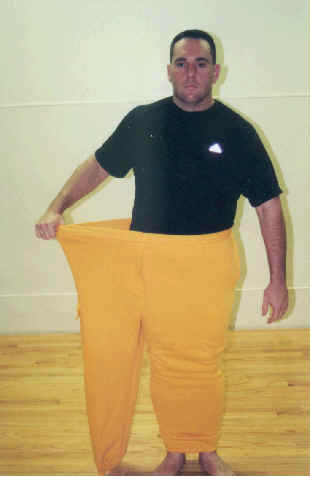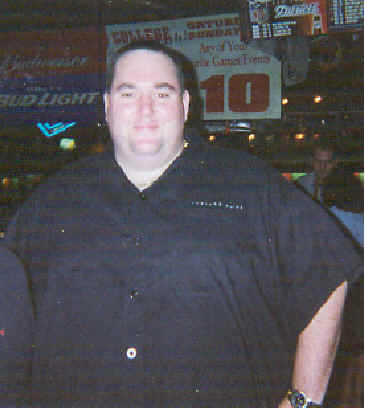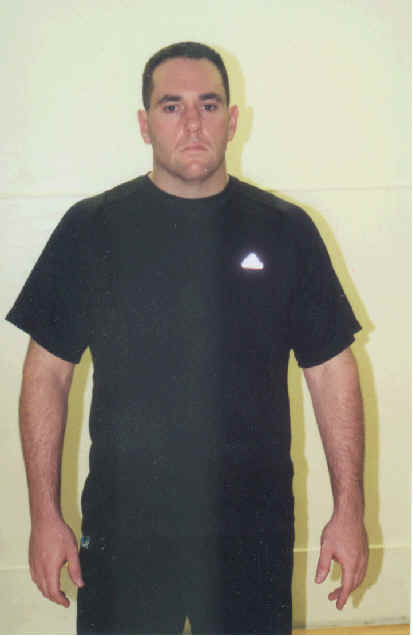
Sensei Polsky: Half the Man He Used To Be
Jared did it with Subway
© and Al Roker did it with surgery; lots of people try to do it with fad diets, but Sensei Brian Polsky did it using the mental disciplines he learned in the Martial Arts. What he did was shed over 200 pounds of weight in less than a year. No surgery and no fad diets were involved, just an understanding of how the body works and the resolve to follow through and rebuild himself through nutrition and exercise into the man he has become.
The turnaround for Sensei Polsky began in November of 2001 when he ran into Sensei Robert Mason while shopping at the local mall. At that time Sensei Mason said, “I had not seen Brian for several years. I recognized him from a distance and could tell he had put on a lot of weight.” Sensei Mason approached him and asked what he was up to, to which Sensei Polsky replied, “...about four hundred and fifty pounds.” In fact, at that time he was actually 457 pounds and suffering from several weight related health problems including high blood pressure, high cholesterol, asthma, heartburn, sleep apnea and severe nerve pains along with several herniated discs in his back. Sensei Mason commented, “Brian has always been a stout guy. He started training with me when he was eleven and received his Black Belt in 1989 at age seventeen. He was big, but not obese.” Sensei Polsky was a Florida State Martial Arts Champion in 1989 and won the “Battle of Atlanta” National Championships, one of the biggest Martial Arts events in the world, in 1992. He achieved his Nidan (2nd Degree Black Belt) at the University Karate Center in September 1993 where he was also teaching Martial Arts. “Brian only trained intermittently after he got his second Dan,” Sensei Mason commented, “It was then that he began to put on weight, especially following an injury in 1995 when he stopped working out altogether.”

Between 1995 and 2001 Sensei Polsky ballooned from a fit 220 pounds to over 450 pounds. He also began dieting, attempting every plan known to man, including those known to women. Nothing worked and his weight kept increasing. One thing Sensei Polsky recalls from that period was that he never thought he was obese. He was always dieting and just did not perceive himself as suffering from morbid obesity. “No one ever told me I was obese, and my friends and girlfriend said that they liked me the way I was,” he said, “It was not until that day in the mall when I saw the look on Sensei Mason’s face that I realized what bad shape I was in,” Sensei Polsky recalls. “It was as if I saw myself for the first time through his eyes, as being really fat”. From that point on Sensei Polsky got to thinking about what he needed to do to change his life to reconstruct himself in a better image. Not just another diet, but a complete adjustment in his view of himself and his ambitions for himself was required. Sensei Polsky spent the next two months going back over all of his previous efforts at weight loss to see what had gone wrong. Why had he not lost weight, or when he had, why had it been only temporary? Following this period of study and self-examination he decided to make January 1, 2002 the kickoff day to change his life. This was to be the first day of a new approach to nutrition, exercise and life. Now twelve months and over 230 pounds later, he is literally a new man. He feels physically, emotionally and psychologically rebuilt and energized, and is ready to compete again.

Sensei Polsky got off to a good start on the Florida tournament circuit for 2003, placing second at the Superstar Invitational on January 18th and placing first and winning the Grand Championship at the Fort Myers Championships on January 25th.
Sensei Robert H. Mason © 2003
The New Student
When I was growing up I would always see actors on TV performing martial arts. It was so amazing to me how flexible and disciplined they were. For years I had debated on taking karate classes. I finally got the courage to look into martial arts classes. On my first day of class I was really nervous. When I walked into mudokai, I saw students with colored belts. My hands started sweating. To get over my fear, I had to remind myself that the same students had to start out as a white belt. I knew in my heart that I would not achieve certain goals as fast as others. Today I realize that karate is not a sport to see who can score the most points or who can move the fastest. Karate takes a lot of time and patience. With everything that’s going on in the world today I think everyone should try and accomplish all of their goals in life.
Tanicia Allen
Civility
“Every action in company ought to be with some sign of respect
to those present.” George WashingtonAfter the horrendous attacks of September 11th most Americans and other people living in civilized nations wondered what caused these violent attacks and what they could do to prevent them in the future. Up until then Americans had enjoyed a relatively serene existence, living in a protected homeland that had never been attacked in their lifetime. However, 9-11 changed all that and our President instituted the famous “War on Terrorism” which continues to this day.
Misbehavior of the type that we saw on that day is obvious in its destructive nature; yet, the true basis of civilization is civil behavior which is based in respect. Respect is defined as “regard for the rights of others”, “consideration of the viewpoint of another”, and also “to refrain from interfering with”.
While it is obvious when these conditions are not being met with regard to blatant acts of terrorism, it is not so obvious when interactions between individuals are less than respectful.
For instance, here at the karate school we endeavor to practice respect as a tenet of the martial arts. Without respect, martial arts can be dangerous, as the skills that are taught in class can be used offensively just as easily as in defense. The word karate means “empty hand”, and it originated in Okinawa when farmers, who were being terrorized by marauding gangs, needed to learn self-defense, but were forbidden by the governing powers from carrying weapons. Thus, karate has always been defensive which is why we emphasize the need for respect in the Dojo .
Sometimes students, especially those in the Junior classes, forget the need for respect towards other students and toward their Instructor. They become “lazy” in their approach to stretching and to learning the techniques taught in class. They forget to listen, and instead, talk out of turn, showing disrespect by their attitude.
Many years ago a student who tended to misbehave, answer back and not make enough effort in class, was preparing to test for their next rank. They had been warned that their attitude was deficient, especially for a color belt student. At the belt test the student was assuming they would pass the grading and did not make any effort to properly demonstrate what they had learned. They failed the test. The parents watching and the students in that Grading were shocked and upset, yet the student and parent in question understood the reasons for the failure. The student shaped up and was able to pass the test a few months later.
Civility, which includes respect, is the foundation of the martial arts and of life, and the sooner everyone understands and practices this, the sooner we as a community, as a country and as a world, will be able to live in an orderly and sane environment.
Sensei Robert H. Mason © 2003
“Karate begins with courtesy, disciplines the mind and body, builds character, promotes respect, ends with courtesy, and leads to "Wa-no-michi" (Way of Peace).” -excerpt from the Mudokai curriculum #13.